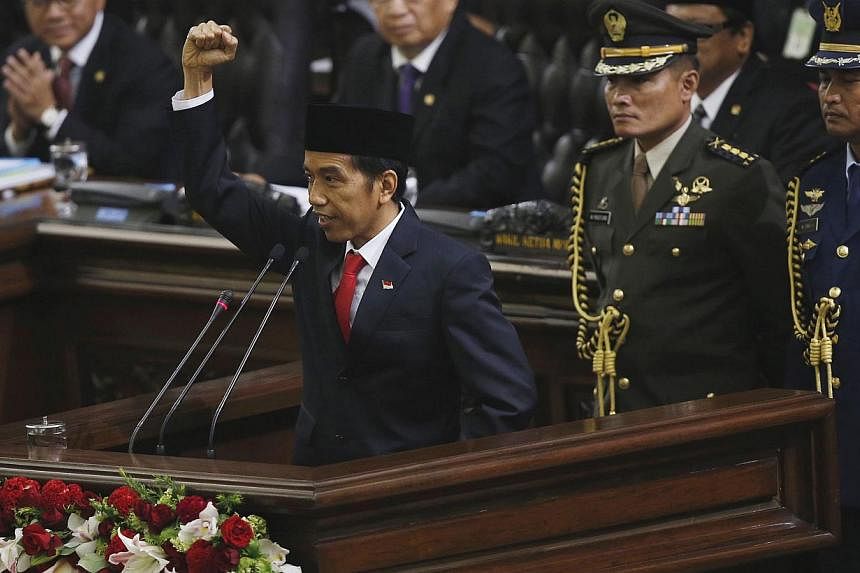Mr Joko Widodo takes the helm of Indonesia on Monday as the country's seventh president. But the road ahead for the popular former Jakarta governor will not be smooth. Here are five of the biggest challenges he faces:
1. No majority in Parliament
Weeks before assuming office, Mr Joko was dealt a blow as his Indonesian Democratic Party-Struggle (PDI-P) failed to attract more allies to secure a majority in the House. It came as the opposition Red-White Coalition - which has the majority of seats and is led by his presidential election rival Prabowo Subianto - secured leadership positions in the House and People's Consultative Assembly.
Several key voices have already said they would impede the running of the government, making it difficult to push through measures. This brings to mind how the US Republican Party has made life difficult in Congress for Democrat President Barack Obama.
Mr Joko will have to form his own working coalition to deal with a Parliament stacked with mostly his rivals - including Prabowo who refused to concede the election to him until a court order - and come out on top in a clean, above-board manner.
2. Setting up a clean and efficient Cabinet
Mr Joko needs to find experienced ministers to make up for his own relative inexperience, using them to get support from Parliament and ensuring his picks are corruption-free. In a radical, unprecedented move earlier this year, he asked for public input in choosing his Cabinet, putting names of potential picks on Facebook. He has also submitted names of ministerial candidates to anti-graft agencies for screening, according to his aides, in a move widely applauded by the public.
But he has faced pressure from party bigwigs to include certain figures, and he will find it tough to say no.
3. Balancing of budget and cutting of subsidies
The 2014 Budget deficit had been targeted at 2.4 per cent of Gross Domestic Product, but it is in danger of busting a budget law setting the limit at 3 per cent, partly because of a shortfall in tax revenues. Indonesia's tax take is just 11.7 per cent of GDP and only 12 per cent of its citizens pay taxes
However, 25 per cent to 30 per cent of this meagre take is spent on fuel subsidies, leaving less for badly needed basic public services and building of infrastructure like roads, railway, airports and seaports, among other things.
It has been reported that Mr Joko plans to order the steepest rise in subsidised fuel prices in nine years soon after he takes over as president. He reportedly plans to raise the price of gasoline by 46 per cent, and diesel by 55 per cent, possibly as early as Nov 1. This will save the government nearly US$13 billion next year.
4. Threat of extremism and ISIS
The current wave of extremism in the world, realised in brutal form by the Islamic State in Iraq and Sryia (ISIS), is not new to Indonesia. The Darul Islam group in West Java has been trying to set up an Islamic state in Indonesia since the 1940s, and mounted an insurgency against the government. Its ideas were picked up by Jemaah Islamiah, which has spread radical Islamist ideology throughout the country.
ISIS has risen rapidly because older terror groups like these remain resilient. Muslims from Indonesia have joined armed groups in the Syrian civil war, and many have gravitated to the ISIS.
Mr Joko must find a way to stem these radical ideologies and stop the existing number of homegrown militants from planning attacks in the country and abroad.
5. Corruption: An endemic cancer
An endemic cancer within the Indonesian government, corruption in the form of pay-offs to goverment facilitators for everything from licence applications to construction tenders is the biggest obstacle to the country's progress. The culture has even infested the police and courts.
Mr Joko must toughen the official stance on corruption and infuse "clean" attitudes and practices through every level of government.
Sources: Sydney Morning Herald, Reuters, AFP

